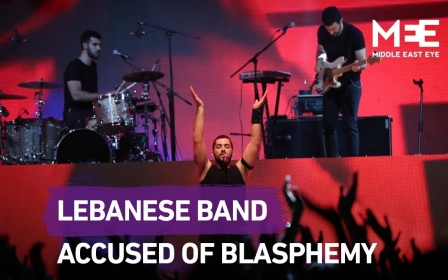US university cancels Mashrou' Leila event in Qatar amid anti-LGBTQ pressure

A US university's Qatar branch has cancelled a scheduled event with Mashrou’ Leila, a popular pro-LGBTQ Lebanese band whose booking created controversy in the conservative emirate.
Two weeks after announcing the discussion about media revolutions in the Middle East, Northwestern University released a statement stating that both the band and the university had come to a “mutually agreed” decision to change the venue of their talk to the university's campus in Illinois, USA.
“We hope that event will facilitate a larger discussion ... about aspects of civil liberties and freedom of expression that are not always open to such discussions in all parts of the world,” the statement read, prompting many to believe the talk was cancelled due to anti-LGBTQ pressure in the country.
Stay informed with MEE's newsletters
Sign up to get the latest alerts, insights and analysis, starting with Turkey Unpacked
Qatari social media users tweeted their rejection of the university's decision to host the band with the hashtag #نرفض_محاضرة_مشروع_ليلى (we refuse Mahrou' Leila's discussion), citing the band’s values as contradictory with the country’s conservatism.
The cancellation of the event has raised questions over Qatar’s readiness to host the 2022 FIFA World Cup and to accommodate hundreds of thousands of football fans from different cultural backgrounds and identities.
“Qatar professes itself as more tolerant than its Gulf neighbours, but the cancellation of Mashrou’ Leila’s talk at Northwestern University in Qatar reflects the Qatari government’s unwillingness to embrace diversity and underscores the country’s repressive climate on free expression," Rasha Younes, an LGBT researcher at Human Rights Watch, told Middle East Eye.
In November, the chief executive of Qatar's 2022 World Cup organising committee, Nasser al-Khater, said no restrictions will be put on “any nationality or anybody with respect to their gender, race, orientation, religion to attend", despite homosexuality being illegal in the emirate.
"If Qatar cannot allow for a media discussion with Mashrou’ Leila because some of its members are openly gay, how is Qatar planning on welcoming LGBT football fans and protecting their rights?" Younes asked.
This is not the first time that free speech in Qatar has been censored to remove mention of sexual orientation and gender identity. In 2018, the private publishing partner of The New York Times, Dar Al Sharq, repeatedly removed LGBT-related content from the international print edition of The New York Times published in Qatar, according to Younes.
Mashrou' Leila, formed at the American University of Beirut in 2008, has been vocal in supporting equal rights, free speech and gay rights. Its lead singer, Hamed Sinno, is openly gay and has faced death threats.
This isn’t the first time the band has had appearances cancelled.
In July last year, Lebanon's Byblos International Festival cancelled a concert following threats from conservative Christians. The gig was cancelled to “prevent bloodshed and to maintain security and stability", the popular festival's organisers said, in a decision denounced by rights groups.
Controversy was sparked in Egypt in 2017 when spectators at the band's show in Cairo waved rainbow flags, resulting in the arrest of 75 concert-goers and provoking a crackdown by authorities on the country’s LGBTQ community.
The group are yet to release a statement on the cancellation of their talk in Qatar and have not responded to a request from Middle East Eye to comment.
MEE has also asked Northwestern University for comment, but received no reply by the time of publication.
Middle East Eye delivers independent and unrivalled coverage and analysis of the Middle East, North Africa and beyond. To learn more about republishing this content and the associated fees, please fill out this form. More about MEE can be found here.




